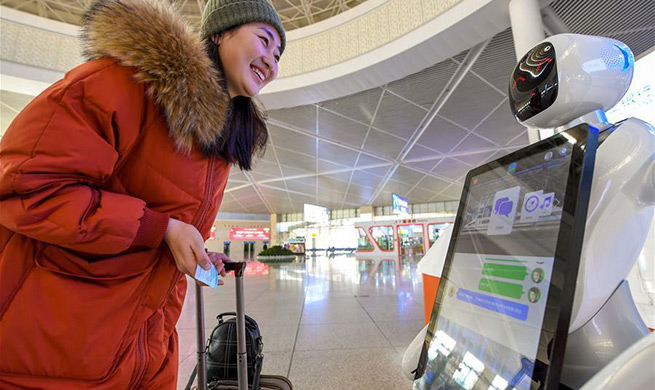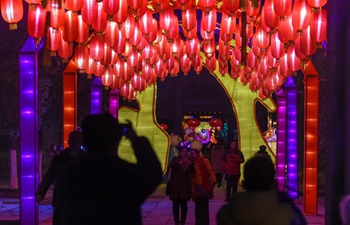FUZHOU, Jan. 23 (Xinhua) -- Noodles boiled in bone soup served with peanut butter, and wontons filled with juicy meat in a sizzling soup -- these are the delicacies that have swept across the streets of China and are making their way overseas.
Shaxian delicacies, originating in Shaxian County in eastern China's Fujian Province, have spread as locals traveling afar set up family-run outlets across the country, becoming well-known in China over the past few decades.
Since mid-2018, the eatery, trademarked Shaxian Snacks, is pushing for rapid expansion overseas, as a spate of Chinese fast-food chains that have enjoyed domestic successes begin to test the waters abroad in recent years.
Brands such as Yang's Braised Chicken Rice entered the U.S. market in 2017 and Mazilu, a brand selling Lanzhou-style beef noodles, opened its first store in Japan in early 2018.
In June, Shaxian Snacks also set up its first overseas franchise in Tokyo and, in November, its first eatery in New York.
As of the end of September, the 80-square-meter Tokyo store was raking in around five million yen (44,563 U.S. dollars) monthly. About one-third of their customers are Japanese residents.
"We have around 10 overseas franchises right now, and we plan to open 10 more in Japan and 15 more in the U.S. in 2019," said Luo Guanghua, head of the product promotion project in Shaxian County.
TASTE OF HOME
Fujian Province, lying on China's eastern coast, is the ancestral home for many overseas Chinese, and the taste of Shaxian delicacies often serves as a common memory.
"In my childhood, food stalls could be seen everywhere in my hometown," said the owner of the New York franchise Shao Binfang, a Chinese American born in the provincial capital.
Shaxian delicacies are among the many dishes from home that Shao still reminisces on after settling down in the U.S. And like Shao's store, all the current franchises are owned by overseas Chinese.
In 2014, the Overseas Chinese Affairs Office rolled out a plan to promote Chinese food overseas, and Shaxian Snacks Group, which is backed by the local government, registered its brand the same year. It then filed trademark applications with 18 countries, regions and organizations.
"We hope to set up Shaxian Snacks wherever there are overseas Chinese and build it into an international brand," said Luo.
To ensure the authenticity of the flavors, the local government established a training center in Shaxian, offering courses since 2018 for overseas Chinese who want to start their businesses abroad.
Lin Wen, a Chinese American, is among over a dozen trainees at the center. Having worked many years in the restaurant industry, Lin plans to open Shaxian Snacks franchises in Boston and Philadelphia.
"It is a good thing that the eateries can reach the overseas communities," said Lin. "We can enjoy the taste of home while creating job opportunities."
At the center, teachers and students also experiment with different cooking methods such as frying and roasting, which are preferred by many overseas customers, to create tastes tailored to different local needs.
"Instead of using spinach seeds in the flour wrappers, the owner of a franchise in France uses green tea powder, which is very popular there," said Lin Baodeng, head of the training center.
BUILDING THE NAME
Around 60,000 stores with the name Shaxian Snacks were once open across China, and they were known for affordable pricing, but the quality of service was inconsistent.
Business waned in recent years under the competition of national food chains, and Shaxian Snacks Group has been working to round up the scattered family-run eateries under a unified brand and set of standards.
The group upgraded the interior design of its franchises and spent 20 million yuan (2.9 million U.S. dollars) on building a "central kitchen" for distributing semi-finished products to the stores, according to Liu Chongxin, who heads the project.
With a red Pac-Man-like logo, Shaxian Snacks built itself into a national food chain with nearly 1,900 stores, and Luo said the group plans to open another 2,000 in 2019.
The kitchen will also explore ways to send products to its overseas franchises, possibly starting with stores in Japan and Southeast Asia, according to Luo.
"A whole unified system of a supply chain is best for the franchises," Lin said. "To build a brand, it is important to set standards from the very beginning."

















